| Reviews & Columns |
|
Reviews DVD TV on DVD Blu-ray 4K UHD International DVDs In Theaters Reviews by Studio Video Games Features Collector Series DVDs Easter Egg Database Interviews DVD Talk Radio Feature Articles Columns Anime Talk DVD Savant Horror DVDs The M.O.D. Squad Art House HD Talk Silent DVD
|
DVD Talk Forum |
|
|
| Resources |
|
DVD Price Search Customer Service #'s RCE Info Links |
|
Columns
|
|
|
Alps

Greek director Giorgos Lanthimos's followup to his startling, excellent breakout film, 2009's Dogtooth (which was shocking not least for all the positive attention it garnered, including a Best Foreign Film Oscar nomination), Alps takes the hermetic lid off the strikingly claustrophobic POV of Dogtooth to let it mingle, frighteningly if not corrosively, out in a much broader swath of the world, which turns out to have its own inescapable feel of invisible but potent circumscription no matter where you go. The last film, with its contemporary upper-middle-class Greek family headed up by parents determined to keep their teen kids "pure" and uncorrupted by the outside world (to the point of sealing them off and distorting their entire vision of life, through well-meaning, escalating psychological abuses, to an initially kind of funny, eventually wholly horrifying degree), boldly laid out Lanthimos's unique (if clearly European-art-film-weaned) vision, which is something like Bunuelian surrealism, satire, and indecipherable metaphor merged seamlessly with a Fassbinderian insistence that even the most intimate social relations are power relations, with the queasy, unspoken threat of emotional and/or physical violence holding the oppressive but familiar structure in place. The "family" depicted in Alps projects that vision even further; unlike the blood-related unit of Dogtooth, this clan can roam freely out in the world, but that doesn't in the slightest loosen the quietly violent, punitive power of the ties that bind them together. One might have gotten the impression that Dogtooth's quarantined children suffered in particular from being cut off in their little social isolation chamber, but Alps strongly suggests that the bizarre rituals, rigorous-yet-arbitrary "family values," and calm, cloistered-in madness so indelibly depicted in Dogtooth didn't represent some exaggerated/satirical anomaly, but rather just a microcosm of the inexorably creeping, sinister cycle of complacency and revolt that Lanthimos sees extending much further throughout much broader social structures and human relations.
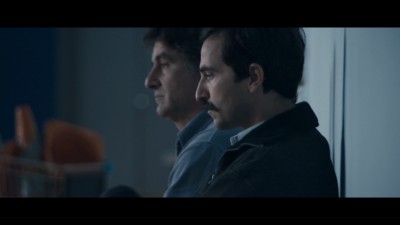
The "Alps" are so called because -- as their paternal leader, a calmly authoritative, mustachioed emergency medical technician (Aris Servetalis), articulates at the group meeting when he announces the ingenious moniker he's come up with -- that legendarily vast and impressive European mountain range consists of peaks that are imposing, immoveable, and irreplaceable, which is evidently a state to which these four characters aspire in a culture where mundane conformity seems inescapable. The work that the Alps have assigned themselves -- which is well facilitated by the EMT's and the nurse's frequent proximity to the newly, often unexpectedly dead -- is to re-embody the recently departed for their grieving families, playing out comforting everyday scenarios as a way of filling in the excruciating empty spot left when someone dies, with the nurse offering condolences and the services of The Alps to, for example, the parents of a recently expired teenage daughter. The Alps is comprised of two platonic male/female pairs: The ambulance driver and the ER nurse (Dogtooth's Aggeliki Papoulia) who know each other through their work, along with a middle-aged gymnastics instructor (Johnny Vekris) and the young female pupil (Attenberg's Ariane Labed) to whom he dictates tyrannically at every level, right down to the choice of musical accompaniment for her elaborately choreographed ribbon-tossing routine. The unexpectedly high, internalized and implicitly understood stakes the group is operating on, the harsh loyalty and discipline it demands of its participants, come to the fore in the film's very first scene, when the gymnast's insistent pleas to her coach that she be allowed to perform to "pop," not Carl Orff's Carmina Burana, are verbally smacked down, in a voice full of certainty and devoid of emotion, with a detailed, gruesome verbal description of the extreme physical punishment that will be visited upon her if she ever raises her voice to him again -- a consistent threat of violence that becomes a difficult-to-watch reality when the nurse oversteps her bounds and the ambulance driver punishes her before viciously excluding her from the group (this is a paternalistic clan if there ever was one; authority and the meting out of punishment is deferred strictly to the father-like males). Exile is an infliction of emotional pain worse than physical punishment, a suffering on the nurse's part that leads up to the film's brilliantly performed and intensely shot/edited conclusion, which succinctly yet fully uses her expulsion (and her futile, wrenchingly desperate attempts afterward to get back into character with the dead tennis player's family, even though her role has been reassigned) to capture, wordlessly and devastatingly, the primal misery of being excluded in an unforgettably powerful way.
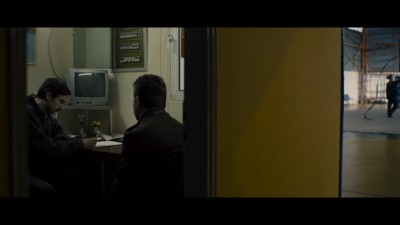
Building tension and gravity through a sort of deadpan composition of the frame, with minute attention to where the characters are in relation to the camera, to the surrounding space, and to other characters, is something Lanthimos seems to know how to do intuitively, and it's a skill deployed everywhere, not just in that shattering denouement. Here, working with cinematographer Christos Voudouris, he creates a sometimes handheld but never shaky, always intensely concentrated, deceptively naturalistic, shallow-focus visual approach that in some scenes creates an Antonioni-like mise-en-scène, with the characters framed in de-centering wide shots so they become a symmetrical part of their anonymous/institutional surroundings, while in others it brings the characters' faces (or, to even more disconcerting effect, their faceless bodies in various moments of repose or sexuality) into close-up and throws them into sharp relief. If their lives are becoming more and more consumed by the replication of the banal dialogue and mannerisms of the recently deceased for whom they're acting as stand-ins, Lanthimos's and Voudouris's camera actually does effectively offer a visual distinction from the horde to these fascinating wannabe-escapees from anonymity and banality with their ill-advised, counterproductive, oddly moving method of attempting that escape. The actors reciprocate their directors' still, quiet, intense gaze; they trust and give themselves over to their characters' halting, affectless exteriors, stilted dialogue, and more-revealing but still uniformly stoical facial expressions to reveal by default the pain, fear, rage, isolation, and yearning that has actually brought them together to form their fascistically dysfunctional "family unit," and it works incredibly well. Lanthimos and his technicians have crafted an apt aural dimension for the Alps and their world, too; the still-life quiet of bourgeois Athenian ways of living is essential to the film's building (and, in the end, shattering) of a recognizable, stifling environment and, like most any good contemporary European filmmaker (most of the best being spiritual children of Robert Bresson and his ingenious reconsiderations and displacements of movie sound), he makes a captivating virtue out of refusing any semblance non-diegetic score, though music as it occurs in the characters' experience, particularly different kinds of music and what they represent, plays quite a significant narrative role, as mentioned above in the Carmina Burana vs. "pop" conflict, which ends up providing much more of a through-line/thematic bookend to the film than initially anticipated. Within these silences that alternate with stilted recitations in the Alps' world, where everything is role-playing and rote recitation in the paradoxical name of jockeying for "irreplaceability," director, actors, and technical craftspeople create a hypnotic sense of hopeless struggle against an encroaching, overwhelming paralysis of emotion and behavior; this world, as Lanthimos sees it, is an eerie vacuum where the inevitable dropping of the other shoe becomes something we both dread and eagerly anticipate right along with these probably deranged people, who are fighting back against a modern-life malcontent in the only flawed, impotent, self-destructive way they seem to know how -- anything, any perverse or strange convolution to resist the deadening spell, to at least try to acknowledge and feel real emotion, and to be something other than just another of the human automatons produced en masse by their time, place, and class.
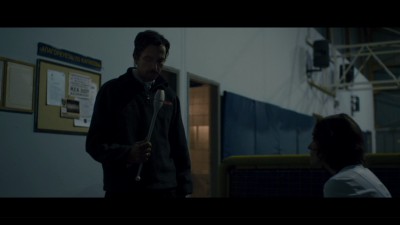
There's a hell of a lot going on in Alps, but it is a film whose stupendous ambition is played very straightforwardly, very deadpan, with great assurance, no matter how far-out or improbable its story conceits; its confidence and forthrightness lull us into taking its absurd-on-paper surrealism as something that's unquestionably "really" happening. Among the many subjects Lanthimos has in his sights is the effects of cultural valuation on individuals' sensibilities and personalities: As in Dogtooth -- with its very odd-looking reenactments, creepy and liberating in equal measure, of Rambo and Flashdance by the teen daughters who have exposed themselves on the sly to the tantalizing, contraband trash of movies from the outside world -- Alps has a leery, heavily fraught thematic fascination with pop culture as it collides and vies with the airlessness of ostensibly higher things (one guesses this concern is especially immediate to an educated Athenian like Lanthimos, coming as he does from the ruined cradle of Western civilization, which is now just as firmly a part of the same pop-saturated, ahistorical dominant culture as anywhere else); in the most basic and boiled-down sense, Alps is a film about a girl who wants more than anything to be allowed out of classicism and into the world of pop, who is finally set free to do so at a horrible cost to her mother (figure), who virtually crucifies herself to free the kid from the burdensome weight of the past and its demands.
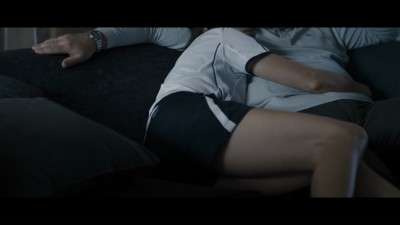
But that's just one item on Lanthimos's generous sampler platter of modern-life conundrums; he also tackles the complicated theme of identity in celebrity culture, the promise of blazing-bright, fame-validated personality and its erosion of any line dividing individual personality from the role-playing aspiration to become someone else. The EMT's way of keeping the horribly injured awake and with him is to query them, systematically and insistently, about favorite actors; a favorite group game consists of a form of charades in which each of the Alps takes a turn momentarily "replacing" a dead celebrity (Bruce Lee, for example, or Prince, though that's a moment of mordant humor, since he's not actually dead); there is a deep-seated, penetrating, melancholy sense of foreboding in the film around this emphasis on celebrities and tidy pop-culture categorizations, since the Alps are at the same time mounting an inevitably failed attempt to become "irreplaceable" through their skill at aspiring/pretending to be someone else. It's a credit to Lanthimos's openness to genuinely exploring these themes (among the film's generous handful of others), and to the keenly observant skill with which he executes his troubled vision, that they don't just pile up and jumble into a dry, chaotic cerebral mishmash, but instead flow through the film as rich, fascinating, urgent streams of questions that wash over us and pull us raptly under. The question of what all the strange, unlikely but palpably true/"real" misadventures of the Alps means remains, of course, an open one, to an extent that may frustrate some viewers. But the film is never vague. It has a rare courage of conviction, so that the morass of troubling questions and paucity of ready answers with which its meticulous, finely calibrated observations confront us are never anything less than concrete, as visible and transparent as possible regardless of any fully explanatory answers remaining stubbornly ungraspable. By the time Alps comes to its perfectly fitting yet exceedingly consternating close, the spell has been cast, the irreversible impact has been made, and the confluence of urgent tangibility and provocative indecipherability in what you've experienced provokes nothing so much as a heartbroken need to figure out not what happened (it's crystal clear), but why. The film riles up a strong, itchy drive to re-enter the Alps' world to search for any clues or hints you might not have discerned the first time around in Lanthimos's teeming, lucidly mysterious, stark but vivid tableau of contemporary civilization and its difficult-to-articulate discontents, the ultimately irreducible quality of which gives it an unshakeable staying power.
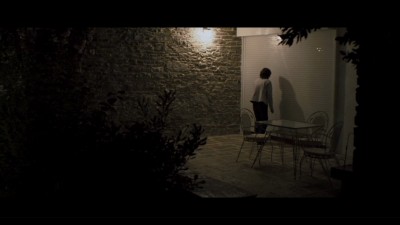
THE DVD:
The transfer, which presents the film in anamorphic widescreen at its original theatrical aspect ratio of 2.35:1, is near-excellent. There is no aliasing that I could discern, and all colors and dark portions of the screen are nice, vivid (or, I should say, as vivid as they're meant to be; this is a dim-lit, gray-weather film that was never intended to be a feast of colorfulness), and solid. There is a little edge enhancement, but nothing that's ever very noticeable or disruptive. The main problem would seem to be a bit too much digital noise reduction compromising some of the "grainy" celluloid texture of the film; because of the film's unusually cool lighting (in general) and shallow-focus style, however, this is difficult to say for certain, and because the picture quality is generally quite good, I'm giving this one the benefit of the doubt.
Sound:The Dolby Digital 2.0 "stereo" soundtrack (my sound system manifested the sound as mono, coming exclusively out of the center speaker, which actually sounded exactly right) is very fine; all of the sound is deep and multilayered, whether it's the dialogue, the music (always strictly diegetic; there is no score), and other, less comfortable sounds (the endless rapid-fire bleeping of a car alarm, the cringe-inducing crack of a club against a skull) make the precise impact that the Lanthimos and the film's conscientious sound designers meant them to. In Greek with non-optional ("burned in") English subtitles.
Extras:Very few, unfortunately; this is a pity especially because Lanthimos is an appealing and articulate figure who knows how to seriously discuss his films without being reductive, and there must be interviews and Q&As galore out there that might have been included, even if the director wasn't interested in providing a commentary. What we do get is the theatrical trailer and teaser trailer for the film, along with trailers for Kino releases related either directly (Dogtooth) or very vaguely (The Fairy).
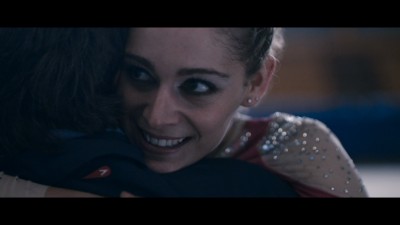
Even more of a nagging, unshakeable puzzle than Greek director Giorgos Lanthimos's international breakthrough, Dogtooth, his latest, Alps, finds the social and cultural ties that bind human beings together in groups and hierarchies even more strange, resilient, and far-reaching than asserted by its predecessor. The little clan of the title -- a group of middle-class Athenians who have formed a cult of four centered around the unusual avocational activity of hiring themselves out to stand in for the recently departed in the lives of those who have suffered the loss of a loved one -- has named itself after the vast European mountain range because of the distinctiveness, the unmistakable personality and irreplaceability of its snow-capped peaks, which (along with virtually every other event and development of character in the film) points up the overarching insecurity about being special, "irreplaceable," that permeates every aspect of bourgeois life taken in by Alps's unblinking, penetrating, subtly stylish gaze. The concept of conformity vs. individuation manifests in a most intriguing engaging, puzzling, and calmly disorienting way (on visual as much as story terms) in this movie, with an absurdist scenario that plays out, under Lanthimos's scarily confident hand, as now blackly funny, now heartbreaking, now brutal, with no map to separate the surreal from the real, the pathetic from the noble, and no key to entirely unlock the film's strongly evocative paradoxes. (For one, what does the group's preoccupation with being "irreplaceable" mean in light of their actively, as an obsessive hobby, seeking to stand in for the least-replaceable people in the lives of others? Are they, to further the paradoxical sense that permeates the film, digging themselves even deeper into the conventions, complacency, and stifling hierarchy in the world around them in their misguided, rigorous, sometimes horrendously cruel and violent attempt to exempt themselves?). The look and feel of Alps is clean (but never tidy or reducible), streamlined, even elegant, but that's all the better to take you by surprise with the reverberating subterranean shockwaves the experience sets off in your mind: This is a movie that's genuinely unnerving, emotionally elliptical, and more gratifying than satisfying -- something that demands that you come back to it once more, and then again, both to enjoy the aesthetic heights it scales as a brilliant piece of cinema and to continue your search for its sure-to-be-troubling meaning, which is alluring and elusive in equal measures. Highly Recommended.
|
| Popular Reviews |
| Sponsored Links |
|
|
| Sponsored Links |
|
|
| Release List | Reviews | Shop | Newsletter | Forum | DVD Giveaways | Blu-Ray | Advertise |
|
Copyright 2024 DVDTalk.com All Rights Reserved. Legal Info, Privacy Policy, Terms of Use,
Manage Preferences,
Your Privacy Choices | |||||||














